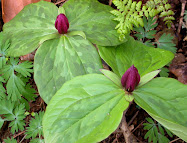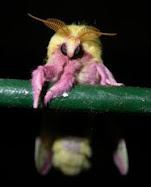To begin with I had to put on those over sized baggie waders which totally felt strange. But had I not had them on I would have felt stranger as I would surely have been shocked along with the fish. Like the fish it would not have killed me. It stuns the fish just long enough for us to catch them in a net.
Electofishing is a common survey method used to find abundance, density and species composition of the streams. It has become a good way to monitor stream health along with the normal stream insect surveys.
Our instructors used a backpack electrofisher generator that was gas powered. Two electrodes are use, the anode is located at the end of a long pole and the cathodes is a long cable that ran through the water to the other side of the bank and delivered the stunning electrical shock.
As they turned the switch off and on the fish were stunned and we grabbed them before they could recover and dumped them into a bucket of water so we could later see what we caught. Count the number and look at the diversity. I was surprised by how many different fish we caught.
Back at the lab we learned how to count fish scales and other features to identify fish. In my area they have found male fish that have female reproductive parts and is has become something to be concerned about. Scientists say chemicals that mimic hormones and disrupt the endocrine system are believed to be the leading reason for the intersex conditions. The chemicals may be birth control pills, pharmaceuticals or some of the newer herbicides and pesticides that are flushed into waste water or that run off farms and feedlots. I am certainly glad that I get my water from a well instead of the river.
I learned a lot from this class and now have an extra admiration and appreciation on for the work that my friend the fishdoc does at the USGS studying the fish in the Potomac and other rivers and streams. Even though it was all very interesting, I don't think I will be doing much of it in the future. There is just too much of the "Ick" factor in being an Ichthyologist for me. Water quality is something we should all be concerned with no mater our level of involvement in the research.
Visit Watery Wednesday for some really pretty photos of water.










+DSCN5800+for+blog.jpg)




2 comments:
An interesting class and an interesting read. Shocking fish a double meaning here, for what you are finding is a point of concern and it is 'shocking' or rather alarming how pollutants are rapidly alternating our environment and can we reverse it and what will it take to reverse this alarming trend?
A few questions for starters..
Joanny
Wow, that would be a fun adventure. I am from West Virginia but haven't explore the whole state yet, I envy you for doing so. God bless!
Post a Comment